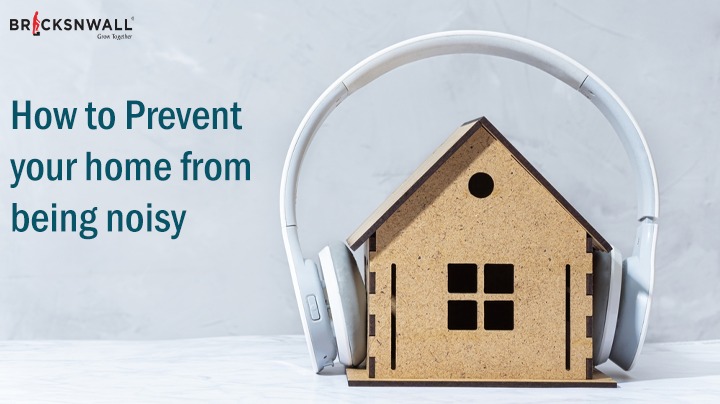How to prevent your home from being noisy
Bricksnwall Trusted Experts

The World
Health Organization (WHO) states that one of the environmental elements that
contributes to the greatest number of illnesses is noise. We are oblivious to
its detrimental effects because we are accustomed to producing and living with
it.
Human health
and well-being are negatively impacted by constant noise in various ways.
Prolonged exposure to noise can harm one's hearing over time. In addition, it
may affect sleep, focus and performance, bodily processes, mental health, and
social and behavioral aspects of conduct.
Because of
this, the first place we should look to reduce noise in our immediate
surroundings is our home. Everybody wants their home to be a place where
they can unwind and rest, a refuge of tranquility where they can relish those
long-desired quiet moments.
We may
prioritize our health and well-being while still creating a stylish,
comfortable, and inviting house by using these easy design suggestions and
methods.
Finding
strategies to limit outside noise is the first thing to think about while
trying to reduce noise inside. Next, try to minimize inside noise as much as
you can.
Here are a
few simple yet effective design ideas that block and absorb sound waves to keep
noise out of your house.
To
absorb sounds, cover surfaces.
One simple
and secure method to lower noise levels is to cover rough surfaces or fill
vacant spaces. A delicately patterned hand-woven cotton rug can provide a
sophisticated and endearing touch. A plush rug exudes coziness, while a
floral-patterned Persian rug adds a more traditional feel. Jute rugs are an
additional alternative for more environmentally friendly options. Another
option for reducing noise from the floor below is carpeting.
Accentuation
soundproofing
A
significant strategy for lowering noise is to insulate windows, doors, and
walls. If you don't want to undertake a full insulation installation, you can
lessen noise by installing basic weather stripping. Regarding decorative
soundproofing, curtains and wallpaper not only alter a space's appearance but
also significantly reduce noise, particularly in rooms with small windows.
Select a look that complements your preferred decorating style, such as heavy
velvet curtains, Venetian blinds, or soft, classic drapes. You can utilize
lovely materials for the remainder of the house in addition to the floors and
windows. For instance, set a couple unframed pictures or a beautiful patterned
rug on the wall.
Bringing
coziness and functionality together
Additionally,
furniture naturally insulates, so placing couches and chairs in the right places
will help to reduce the impact of outside noise. To lessen the effect of noise,
a tall bookcase or cabinet might be placed on the wall that is shared with the
neighbor. Choosing a completely cushioned sofa over a formal or simple type is
also beneficial because soft, cushioned surfaces dampen sound.
Dividing
the area
It is
helpful to partition an open area into smaller corners if we reside there. To
divide the space into distinct areas, hang long curtains or arrange big plants
in key locations. In addition to reframing and deflecting sound, plants help
purify the air, which is good for your health.
Look
for energy-saving measures.
Air
conditioners and household appliances are two other sources of noise pollution.
Energy-efficient appliances are quieter, and we actively support the
sustainability of the environment in addition to saving money at home.
Restructure
Sometimes inadequate sound insulation stems from the house's structural design, in which case the aforementioned fixes might not be enough. In this instance, adding shutters, installing double-pane windows, or covering the walls and ceiling with polyurethane foam could all be answered.




